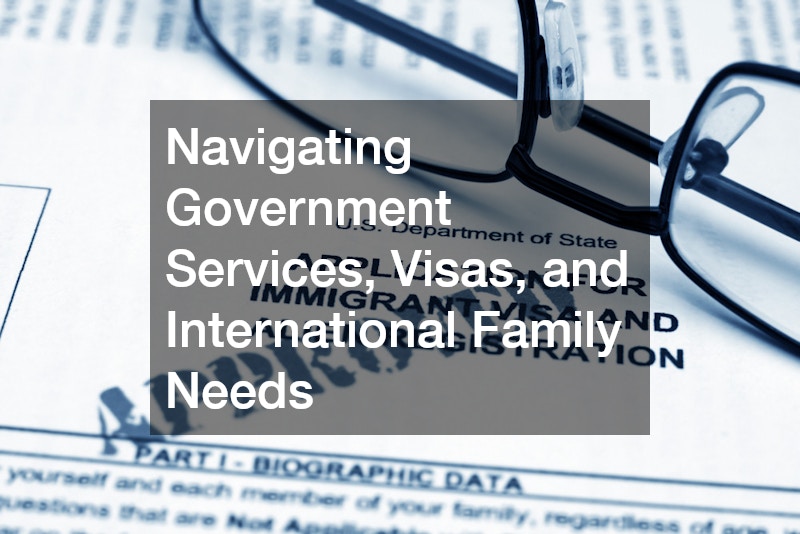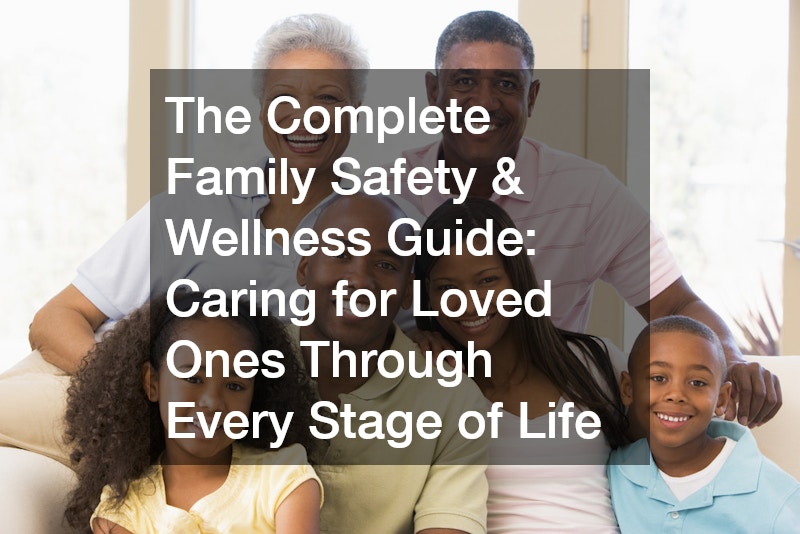Caring for your family in today’s world means learning how to prepare for challenges, support loved ones through life transitions, and manage the everyday responsibilities that keep a household strong and connected. Families face a wide spectrum of needs, from ensuring access to reliable healthcare to dealing with emergencies, managing educational choices, navigating legal situations, and planning for long-term safety. Whether raising young children, caring for aging parents, or supporting relatives through unexpected circumstances, families benefit greatly from having a clear plan and a set of trusted resources they can rely on. This guide explores the most important areas of family well-being, providing practical advice that can help you build a safer, healthier future. With thoughtful preparation and informed decision-making, families can grow stronger through every stage of life.
Family safety and wellness are not one-time tasks but ongoing commitments. Strengthening your household means knowing which professionals to contact in different scenarios, understanding the systems that support good health, and identifying tools that help protect the people you care about most. It also means developing emotional resilience, learning how to manage stress, and staying proactive about preventive care. Small decisions—like establishing safer home routines, recognizing early health warning signs, or staying informed about community services—can make a life-changing difference. No matter what your family’s structure or situation may be, taking a holistic approach to safety and wellness helps you stay prepared for the unexpected, care for loved ones with confidence, and create an environment where everyone can thrive physically, mentally, and emotionally.
Health Emergencies and Family Medical Readiness
When a loved one is hurt unexpectedly, knowing what steps to take can save time, reduce complications, and provide much-needed reassurance during stressful moments. Families should have a health readiness plan that includes emergency contacts, nearby urgent care locations, allergy and medication records, and basic first-aid supplies. Understanding how to respond to injuries and illnesses empowers family members to act quickly while waiting for medical help. It’s also beneficial to identify specialists in your area who can provide immediate care when needed, such as clinics offering a wound care service capable of assisting with injuries that require professional treatment. By establishing clear protocols and keeping essential information accessible, you ensure that every family member knows how to respond confidently. Preparation not only reduces panic but also encourages a proactive mindset that improves overall household safety long term.
Legal Protection and Support During Unexpected Life Events

Families often encounter legal situations that require professional guidance, especially during accidents, disputes, or major life changes. Knowing your rights and understanding the resources available to you can significantly reduce the stress of an already difficult moment. It is helpful to keep contact information for relevant professionals, such as an accident attorney who can advise you after an injury or collision and help ensure your family receives the representation it needs. Legal preparedness also includes organizing important documents, such as insurance records, identification papers, healthcare directives, and emergency authorizations. Having these items gathered in one place prevents chaos and confusion when urgent decisions arise. Families should also discuss roles and responsibilities ahead of time, so everyone understands how decisions will be made if legal or medical action becomes necessary. Preparedness builds stability, protects loved ones, and ensures your family is ready to respond even when circumstances are unpredictable.
Planning for Loss and Supporting Loved Ones Through Difficult Times
Although it is emotionally challenging to plan for loss, doing so can provide clarity and comfort during painful experiences. Families who take time to discuss their wishes in advance often find themselves better prepared to navigate difficult decisions. Creating or updating wills, establishing healthcare directives, and outlining memorial preferences are important steps that help alleviate stress when grief is overwhelming. It may also be beneficial to build relationships with funeral homes that offer supportive guidance and compassionate care during these sensitive times. Normalizing conversations about the end of life encourages stronger communication among family members and helps individuals feel more secure about how their wishes will be honored. Planning ahead also helps relieve emotional and logistical burdens, allowing family members to focus on healing and supporting one another. In moments of loss, having clear plans enables families to move through grief with greater peace and unity.
Navigating Government Services, Visas, and International Family Needs

Many families manage legal and administrative responsibilities that involve immigration processes, international documentation, or supporting relatives who live abroad. Understanding how these systems work can feel overwhelming, especially when multiple family members rely on the outcomes. Families may benefit from consulting a family immigration lawyer who can clarify requirements, assist with documentation, and help ensure smooth transitions. Whether applying for visas, uniting relatives from different countries, or securing protections for family members, having professional guidance provides reassurance that important steps are being handled correctly. Families with multicultural or international ties should also keep updated records, copies of passports, and emergency contact information for relevant embassies or consulates. By staying prepared and informed, you create a more stable foundation for your family across geographic or cultural boundaries. Legal guidance and proactive planning help reduce stress and support loved ones through important transitions.
Emergency Preparedness and Household Safety Systems
Planning for emergencies ensures your family is ready to face natural disasters, severe weather, or unexpected home hazards. Begin by identifying common risks in your region, such as floods, storms, or power outages, and create a clear plan tailored to those possibilities. Families can increase safety by preparing emergency kits, storing food and water supplies, and maintaining a designated meeting place if separation occurs. Some households also choose to enhance protection with specialized structures, such as installing a tornado shelter to provide secure refuge during extreme weather. Beyond physical preparedness, families should also practice drills, teach children how to contact emergency services, and ensure all household members understand escape routes. Keeping communication tools charged and accessible further strengthens readiness. With thoughtful planning and regular review, families build confidence and resilience, ensuring they can respond effectively and safely when emergencies arise.
Understanding Modern Medical Diagnostics and Advanced Care Options

Advancements in medical technology continue to improve diagnostic accuracy and treatment speed, giving families more tools for maintaining long-term health. When unexpected symptoms arise or chronic issues need evaluation, modern imaging techniques allow doctors to make better-informed decisions without invasive procedures. One example is an open upright mri, which offers a more comfortable experience for patients who struggle with traditional enclosed machines. Understanding which diagnostic tools are available empowers families to seek appropriate care and advocate for loved ones, especially those with special needs, mobility limitations, or anxiety about medical procedures. Maintaining organized medical records, scheduling routine checkups, and discussing symptoms openly can further improve diagnostic accuracy. Families should also research local specialists and facilities, ensuring they know where to turn when advanced testing is needed. By understanding modern healthcare options, families strengthen their ability to manage both everyday wellness and unexpected medical challenges.
Supporting Children’s Early Development and Educational Foundations
Early childhood education plays a central role in shaping a child’s cognitive, emotional, and social development. Families should explore diverse learning environments, teaching styles, and curriculum approaches to identify which best supports their child’s needs. In some cases, families may even consider international programs, such as enrolling in a kindergarten school in singapore that emphasizes structured learning, cultural exposure, and globally focused instruction. Regardless of location, strong educational foundations help children develop critical thinking skills, emotional intelligence, and positive learning habits. Parents can reinforce early learning at home by establishing routines, reading regularly, and encouraging curiosity through hands-on activities. It is also helpful to communicate closely with teachers and stay informed about educational milestones. Supporting early development requires patience, consistency, and a nurturing home environment that fosters confidence and growth. By prioritizing strong early education, families give children the tools they need to succeed throughout life.
Dental Health and Handling Urgent Oral Care Needs

Maintaining good oral health is essential for overall family wellness, as dental issues can cause discomfort, infections, and complications that affect daily routines. Families should schedule regular checkups, practice strong hygiene habits, and stay aware of early warning signs such as sensitivity or swelling. Sometimes dental emergencies arise unexpectedly, and knowing where to turn can prevent further complications. Identifying an emergency cosmetic dentist in advance ensures your family can access prompt care if accidents cause chipped teeth, severe pain, or sudden infections. Parents should also teach children safe brushing techniques, healthy eating habits, and the importance of wearing protective gear during sports. By combining daily prevention with knowledge of emergency resources, families can protect their oral health and minimize the stress associated with sudden dental problems. Prioritizing dental wellness ensures comfort, confidence, and long-term well-being for every member of the household.
Caring for Aging Parents and Supporting Loved Ones at Home
As parents and older relatives age, families often take on additional responsibilities to ensure safety, comfort, and independence. Understanding what support options are available helps families make thoughtful decisions that respect both the physical needs and personal preferences of aging family members. Many households explore local home care services that provide assistance with daily routines, mobility, medication reminders, and companionship. These services help older adults maintain independence while reducing stress on caregivers. Families should also evaluate home environments for fall risks, install supportive equipment, and create routines that encourage healthy meals and regular activity. Conversations about long-term needs, medical preferences, and emergency plans can also prepare families for future transitions. By combining professional assistance with compassionate communication, households can create a caregiving plan that honors loved ones while strengthening family bonds through changing seasons of life.
Addressing Mental Health, Addiction, and Co-Occurring Challenges
Supporting family members through mental health challenges requires patience, understanding, and access to appropriate professional care. Conditions such as anxiety, depression, and addiction can deeply affect individuals and their families, but recovery becomes more achievable with early intervention and open communication. For individuals facing both mental health concerns and substance-related issues, specialized programs such as dual diagnosis treatment provide integrated care that addresses both conditions simultaneously. Families can assist by creating supportive environments, encouraging healthy routines, and educating themselves about symptoms and treatment options. It is also helpful to reduce stigma by normalizing conversations about emotional well-being and seeking help when needed. By learning about available resources, families can guide loved ones toward recovery, stability, and healthier long-term outcomes. Mental health support is an essential part of family wellness, helping individuals regain balance and strengthen relationships across generations.
Caring for your family’s safety and wellness is a lifelong process that evolves with each stage of life. From supporting young children to guiding aging parents, from preparing for emergencies to managing legal or medical challenges, every household benefits from having strong systems and trusted resources in place. Building a family culture rooted in preparation, communication, and compassion helps you respond gracefully to unexpected events while nurturing long-term well-being. As you continue to adapt and grow, the strategies in this guide can help you create a stable, healthy, and supportive environment where every family member feels valued and protected. Whether you are reinforcing daily routines, seeking specialized professional care, or planning for the future, the steps you take now contribute to a safer, stronger, and more connected family for years to come.
Maintaining a healthy and resilient family also requires ongoing reflection and a willingness to adjust as circumstances change. As children grow, careers evolve, or loved ones face new health or emotional challenges, your family’s needs will shift. Regularly updating emergency plans, revisiting legal documents, checking in on each person’s well-being, and renewing connections with trusted professionals can help you stay prepared and confident. Small, consistent actions—such as strengthening communication, prioritizing preventive care, and fostering supportive relationships—build a solid foundation that benefits every generation. By staying informed, adaptable, and compassionate, you create a home environment where safety, wellness, and long-term stability remain at the heart of your family’s journey.




